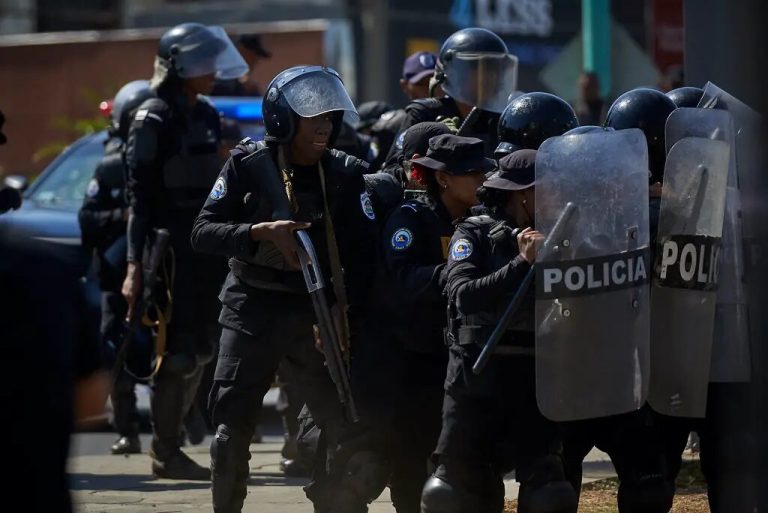20 de abril 2023

Children of Exile: The Births “Sowing Hope” in the Camp of Nicaraguan Farmers

PUBLICIDAD 1M
PUBLICIDAD 4D
PUBLICIDAD 5D
Five years after the April Rebellion, the regime “incorporates new patterns” of human rights violations, according to the organization

Riot police charge against a peaceful demonstration in March 2019. Photo: Confidencial.
Amnesty International reported on Tuesday that the Nicaraguan government, presided over by Daniel Ortega, continues to “increase” and “redesign” the “policy of repression” five years after the massive protests of 2018, in addition to the “incorporation of new patterns of violations.”
The international organization presented the report “A Cry for Justice: Five Years of Oppression and Resistance in Nicaragua.” Amnesty International’s director for the Americas, Erika Guevara Rosas, said that in that document “through the documentation of emblematic cases, we show the continuum of repression to which Nicaraguan society has been subjected.”
As well as “the different patterns of human rights violations suffered by people who dare to raise their voice to denounce the crisis experienced by the country and demand the respect and full enjoyment of rights in Nicaragua,” she added.
On April 18, 2018, a series of demonstrations began in which thousands of Nicaraguans would take to the streets to protest controversial social security reforms, which later turned into a demand for Ortega’s resignation after he responded with lethal force.
The protests left at least 355 dead according to the Inter-American Commission on Human Rights (IACHR), although Nicaraguan organizations raise the figure to 684, while Ortega recognizes that there were “more than 300” and maintains that it was an attempted coup d’état.
The report details the main “tactics” used by the government of Ortega and his wife, Vice President Rosario Murillo, such as “the excessive use of force, the use of criminal law to unjustly criminalize activists and dissidents, attacks against civil society and forced exile.”
These “methods” represent a “broad range of human rights violations,” such as “arbitrary detention, torture, forced disappearance, extrajudicial executions, and arbitrary denationalization.”
“Co-opting the judicial system”
Amnesty International, through information provided by Nicaraguan organizations gathered in this report, reported on the “co-opting of the judicial system” that counts on the “collaboration” of other authorities to hold “unfair trials against people for the mere fact of being considered critical of the government.”
“Five years after its beginning, the human rights crisis in Nicaragua remains due to the loss of the rule of law, the approval of regulatory reforms that have affected the independence of the judiciary and the closure of human rights control mechanisms, both regional and universal,” said Rosas.
The Government of Nicaragua “has used the criminal process as a tool of control and repression against people considered dissidents or opponents,” which has led to the “imprisonment of hundreds of people,” according to the report.
In the last five years, the Government “has created a series of laws to restrict freedom of association and expression,” in addition to “subjecting” human rights organizations to “smear campaigns, illegitimate interventions in their operations and unjust criminalization of their members.”
According to the report, one of the “most frequent” methods is the “annulment of their legal status, the breaking into their facilities and the confiscation of their properties, severally limiting their capacity to act.”
Stripping of nationality
The report also “addresses the arbitrary deprivation of nationality.” Among the 317 people whose nationality has been withdrawn by Nicaraguan judicial authorities are renowned writers such as Sergio Ramirez and Gioconda Belli, as well as former Ortega comrades such as Dora Maria Tellez, known as “Commander 2.”
Amnesty International notes that in Nicaragua there is “an excessive use of force,” exercised “by the police forces, on many occasions in coordination with para-police groups, who have been responsible for thousands of arbitrary detentions at different times.”
And it points out that “social and economic instability” has caused a “forced departure from the country of thousands of people,” who should “benefit from international protection.”
This article was originally published in Spanish in Confidencial and translated by Havana Times

PUBLICIDAD 3M
Agencia de noticias internacional con sede en Madrid, España. Fundada en Burgos durante la guerra civil española en enero de 1939.
PUBLICIDAD 3D